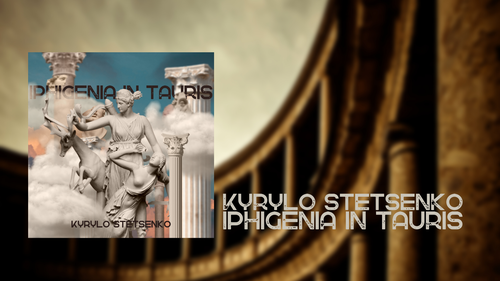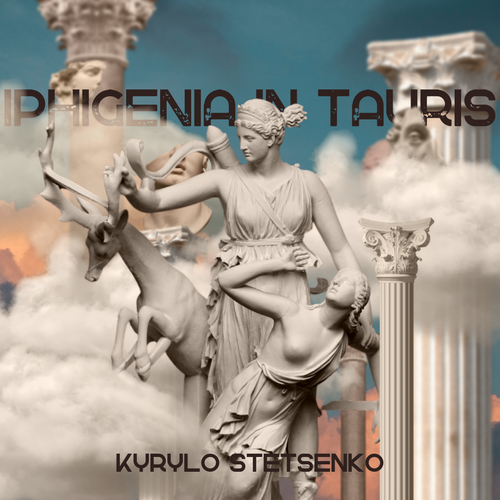On April 29, we honor the memory of the outstanding Ukrainian composer and choirmaster Kyrylo Stetsenko, who passed away 100 years ago. A life full of inspiration, kindness, and love. A priest, a husband, a father, and an artist whose life was suddenly taken by disease at the age of 39. The release presents the last significant work of the composer - the dramatic scene Iphigenia in Tauris based on the drama of the same name by Lesya Ukrainka.
The work is a mono-opera based on the ancient myth of the self-sacrifice of princess Iphigenia for the salvation of the Motherland. The main and only heroine of the story is Iphigenia, the daughter of Mycenae King Agamemnon and his wife Clytemnestra. Having sacrificed Iphigenia to the goddess Artemis, her father hopes to win the battle of Troy. But the goddess herself saves the girl from death by replacing her with a sacrificial deer. Instead, the sacrifice of Iphigenia is as follows: the king's daughter becomes a priestess in the temple of Artemis in Tavrida (or Tauris, Crimea), where on the altar, every stranger who sets foot on the land of Tavrida must die. It turns out that Iphigenia's inability to go and see her loved ones is even more torment than death: her exclamation, "I would rather die a hundred times than live here!" sounds in the last stanza of the scene. But the girl is unable to commit suicide: she humbly obeys the will of Artemis to save the people.
Kyrylo Stetsenko is mostly known for his unique choral (sacred) and solo vocal music. The composer also created music for the theater. Stetsenko worked skillfully with the poetic text. The structure of the opera is subordinate to the dramatic scene, which the poet Lesya Ukrainka borrowed from the ancient Greek tragedy. Choral and large-scale solo episodes alternate with one another, forming a distinctive feature of the work. The choir represents both the narrator and the girls who bring flowers and gifts to the divine altar. Emotionally and vividly voicing the text of the scene Iphigenia in Tauris, Kyrylo Stetsenko emphasized the psychological and dramatic aspect of Lesya Ukrainka`s poetry.
Performed by: soloists and choir of the National Opera of Ukraine, National Symphony Orchestra of Ukraine, conductor - Nataliya Ponomarchuk.
The work is a mono-opera based on the ancient myth of the self-sacrifice of princess Iphigenia for the salvation of the Motherland. The main and only heroine of the story is Iphigenia, the daughter of Mycenae King Agamemnon and his wife Clytemnestra. Having sacrificed Iphigenia to the goddess Artemis, her father hopes to win the battle of Troy. But the goddess herself saves the girl from death by replacing her with a sacrificial deer. Instead, the sacrifice of Iphigenia is as follows: the king's daughter becomes a priestess in the temple of Artemis in Tavrida (or Tauris, Crimea), where on the altar, every stranger who sets foot on the land of Tavrida must die. It turns out that Iphigenia's inability to go and see her loved ones is even more torment than death: her exclamation, "I would rather die a hundred times than live here!" sounds in the last stanza of the scene. But the girl is unable to commit suicide: she humbly obeys the will of Artemis to save the people.
Kyrylo Stetsenko is mostly known for his unique choral (sacred) and solo vocal music. The composer also created music for the theater. Stetsenko worked skillfully with the poetic text. The structure of the opera is subordinate to the dramatic scene, which the poet Lesya Ukrainka borrowed from the ancient Greek tragedy. Choral and large-scale solo episodes alternate with one another, forming a distinctive feature of the work. The choir represents both the narrator and the girls who bring flowers and gifts to the divine altar. Emotionally and vividly voicing the text of the scene Iphigenia in Tauris, Kyrylo Stetsenko emphasized the psychological and dramatic aspect of Lesya Ukrainka`s poetry.
Performed by: soloists and choir of the National Opera of Ukraine, National Symphony Orchestra of Ukraine, conductor - Nataliya Ponomarchuk.
Text by Victoria Antoshevska
Translated by Taras Demko
Translated by Taras Demko
Listen to music
Слухати музику
Performed by:
Soloists and choir of the National Opera of Ukraine
National Symphony Orchestra of Ukraine
Conductor - Natalia Ponomarchuk
Іфігенія в Тавриді
Кирило Стеценко
29 квітня вшановуємо пам’ять видатного українського композитора і хормейстера Кирила Стеценка, що відійшов у засвіти рівно 100 років тому. Життя сповненого наснаги, доброти та любові священника, чоловіка, батька, митця у розквіті творчих сил у віці 39 роки несподівано забрала хвороба. Реліз презентує останню значну роботу композитора – драматичну сцену “Іфігенія в Тавриді” за однойменною драмою Лесі Українки.
Моноопера на сюжет античного міфу про самопожертву царівни Іфігенії задля порятунку Батьківщини – окраса доробку Стеценка. Головна і єдина героїня історії – дочка царя Мікен Агамемнона та його дружини Клітемнестри, Іфігенія. Принісши в жертву богині Артеміді Іфігенію, її батько сподівається на перемогу в поході на Трою. Але сама богиня рятує дівчину від смерті, підмінивши її на жертовну лань. Натомість, жертва Іфігенії полягає в наступному: дочка царя стає жрицею у храмі Артеміди в Тавриді (Криму), на вівтарі якого має гинути кожен чужинець, чия нога ступить на землю Тавриди. Виявляється, що для Іфігенії неможливість повернутися додому і побачити рідних, любих серцю людей – це ще більша мука, ніж смерть: “Воліла б я сто раз умерти, Ніж тута жити!” – звучить в останній строфі сцени. Але дівчина не в силах вчинити самогубство, вона смиренно підкоряється волі Артеміди, щоб зберегти свій народ.
Моноопера на сюжет античного міфу про самопожертву царівни Іфігенії задля порятунку Батьківщини – окраса доробку Стеценка. Головна і єдина героїня історії – дочка царя Мікен Агамемнона та його дружини Клітемнестри, Іфігенія. Принісши в жертву богині Артеміді Іфігенію, її батько сподівається на перемогу в поході на Трою. Але сама богиня рятує дівчину від смерті, підмінивши її на жертовну лань. Натомість, жертва Іфігенії полягає в наступному: дочка царя стає жрицею у храмі Артеміди в Тавриді (Криму), на вівтарі якого має гинути кожен чужинець, чия нога ступить на землю Тавриди. Виявляється, що для Іфігенії неможливість повернутися додому і побачити рідних, любих серцю людей – це ще більша мука, ніж смерть: “Воліла б я сто раз умерти, Ніж тута жити!” – звучить в останній строфі сцени. Але дівчина не в силах вчинити самогубство, вона смиренно підкоряється волі Артеміди, щоб зберегти свій народ.
Ні, се не варт нащадка Прометея!
Коли хто вмів одважно йти на страту,
Той мусить все одважно зустрічать!
Коли для слави рідної країни
Така потрібна жертва Артеміді,
Щоб Іфігенія жила в сій стороні
Без слави, без родини, без імення,
Хай буде так.
Коли хто вмів одважно йти на страту,
Той мусить все одважно зустрічать!
Коли для слави рідної країни
Така потрібна жертва Артеміді,
Щоб Іфігенія жила в сій стороні
Без слави, без родини, без імення,
Хай буде так.
Кирило Стеценко відомий, перш за все, своїм унікальним хоровим (церковним) та вокальним доробком. Але крім цього, композитор мав солідний досвід у створенні музики до театру. Усе це свідчить про те, що Стеценко особливо тонко відчував слово і вмів майстерно працювати з поетичним текстом. Структура музичного матеріалу цілком підпорядковується формі драматичної сцени, яку поетеса запозичила з давньогрецької трагедії. Основним формотворчим чинником є чергування хорових та масштабних сольних епізодів. До слова, хор одночасно уособлює в собі оповідача та дівчат, які приносять квіти і дари до божественного п'єдесталу. Емоційно та яскраво озвушивши текст сцени “Іфігенія в Тавриді”, Кирило Стеценко увиразнив психологізм та драматизм, закладені в поезії Лесі Українки.
Виконавці: солісти і хор Національної опери України, Національний заслужений симфонічний оркестр України, диригент — Наталія Пономарчук
Виконавці: солісти і хор Національної опери України, Національний заслужений симфонічний оркестр України, диригент — Наталія Пономарчук
Текст: Вікторія Антошевська


